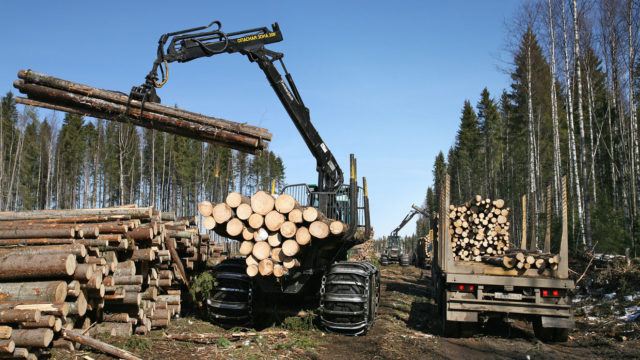
China Turning Russia’s Taiga Into a Desert, Enriching Moscow but Outraging Siberians
Publication: Eurasia Daily Monitor Volume: 17 Issue: 139
By:

Since Vladimir Putin became president, Russia’s forests have declined in size by 45 million hectares, some 6 percent of the country’s total. The shrinking forest cover has been the result of the spread of uncontrolled forest fires (80 percent) as well as increased harvesting (20 percent), much of that for export. That distinction between losses from fires and regular cutting, however, is less sharp than one might expect: many Russians allege that some of the fires, especially in Siberia and the Russian Far East, were set deliberately to conceal illegal cutting (Newizv.ru, September 9). True or not, the issue is becoming ever more political for two reasons. First, a large part of the new logging operations are being carried out by Chinese firms or Russian subcontractors working for them. And second, the profits from exports of wood (processed and unprocessed) to China are going almost exclusively to oligarchs in Moscow rather than to people in the regions that are being left without forests and more at risk of fires and flooding than ever before.
The main drivers of this development, Russian experts say, lie in the new legal code governing forests, the Putin government’s commitment to supply China with lumber both to earn money and to cement ties between the two Eurasian giants, as well as the fact that in the most-affected regions, the governors are not local people but appointed outsiders. Those Kremlin-imposed non-local governors tend to show less concern for putting the interests of their federal subjects first (Rusmonitor.com, October 2).
Both Soviet legislation and Russian laws adopted in the 1990s provided significant protection to Russian forests. But the forestry code adopted under Putin’s tenure eliminated most restrictions on the use of forests, shut down fire-watch and fire-fighting centers, and handed over large segments of the country’s seemingly endless forests to businessmen, whose only interest has been to profit from them even if stripping the timber increased the chronic risk of catastrophic fires and floods. The Kremlin took these steps to ensure that it would continue to enrich itself and its private-sector allies as well as to please Beijing, which looks north to Siberia and the Russian Far East for wood and pulp. China is currently responsible for logging and exporting 90 percent of all timber products from those regions for its own needs. This conversion of areas forested from time immemorial into what some call “lunar landscapes” is becoming a political issue, with local politicians demanding a return of local control over the use of forest, while Moscow plays defense.
One Russian commentator, Vladimir Vorsobin, says that this has sparked “a small civil war” between those engaged in logging and profiting from it and the surrounding populations (Komsomolskaya Pravda, October 2). Some of the protesters in Khabarovsk, in the Russian Far East (see EDM, August 3, 4), have raised this issue. But the most dramatic engagement in this “war” came last week (October 2), when Vorsobin published an open letter to President Putin summing up the anger of Russians living along the Russian-Chinese border and demanding that he change course. In fact, the commentator writes, Russians are outraged that Putin has promised to limit Chinese exploitation of Russian forests repeatedly but, in fact, has continued to profit from the sale of timber to Beijing. From their point of view, he continues, Russians now believe Putin is selling out the interests of the people of Siberia and the Russian Far East for profit, a view that combines class and regional anger at Moscow and is becoming the foundation for a serious political challenge to the center.
At a meeting in early October, Putin promised that he would take steps to regulate the situation, especially after officials said that much of the money from sales to China is going into the coffers not of the central government but into shadowy illegal firms. Opponents of the current approach to forest management were hopeful when business people were excluded from the meeting; but they were troubled by Putin’s failure to take a tough line and even more by the subsequent absence on the Kremlin website of any details regarding what might be done. Some observers have concluded that nothing serious is likely to happen—banning the export of raw lumber, the main announcement Putin did make, will mean that the Chinese will simply process the felled wood in Russia and use its own workers to do so, further outraging local Russian residents. Instead, the Russian taiga will continue to disappear into Chinese hands, and any profit from it will flow out of the local regions (Newizv.ru, October 2).
The conflict over this issue between the central government and business on the one side and the people on the other has not been limited to blog posts, however. Some activists in the Russian Far East have set fire to lumber already harvested and set to be exported to China. “Local bloggers,” one Russian commentator, Aleksandr Nemets, says, “are calling this a partisan war” against both Beijing and Moscow, which supports the Chinese enterprises. Activists have organized large protest gatherings, including in Khabarovsk, whereas Moscow has removed regional officials, including the Communist governor in Irkutsk, who tried to block the export of wood to China (Kasparov.ru, January 9).
According to Nemets, who resides in the United States though closely tracks developments in Asiatic Russia, he does not know how things will develop in the Russian Far East. China remains in a very strong position and has Moscow’s backing. “But obviously, the southeastern regions [of the Russian Far East] have already passed the point of no return,” he concludes (Kasparov.ru, January 9). If this assertion proves true, the Kremlin will eventually face much bigger problems east of the Urals than fires, floods and critical internet posts.



